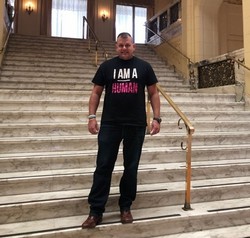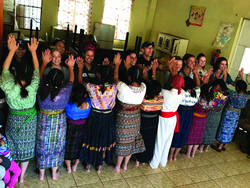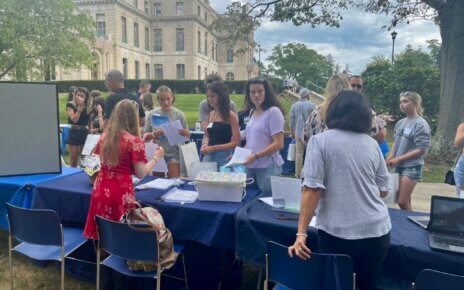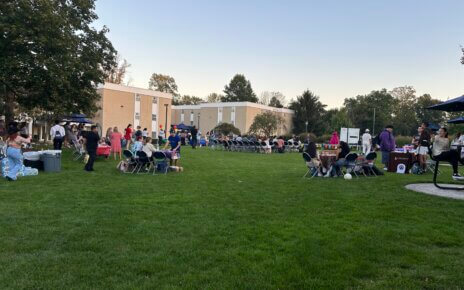On Friday, Oct. 11, The Departments of Criminal Justice, Political Science, Sociology, and The School of Social Work hosted guest speaker David Garlock.
Garlock, who served 13 years in an Alabama prison for committing murder against a man who sexually and physically abused him and his brother for eight years, shared what he calls “The Chapters of My Life.”
But Garlock is much more than the time he served and the acts he committed. He is a human. Let that settle in. A h-u-m-a-n, a person who reminded us that labeling those around us negatively impacts social structure.
Garlock grew up in what, on the outside, seemed like the perfect American family. But his family struggled with some issues—an alcoholic father and a mother who didn’t know how to raise children in that type of environment. His sister was kicked out on the streets at the age of 12 and his brother, due to drugs and alcohol, was kicked out at age 13. His brother then settled in a receiving home in Seattle where the long story of abuse began.
Garlock’s long years of abuse transformed him into a person he wasn’t confident in. But now, living in God’s forgiveness, Garlock shared the chapters of his life that have propelled him into the human he is today.
I had the pleasure of getting to sit down with Garlock and ask some questions pertaining to the justice system and his time while incarcerated. During the interview one of the most striking conversations we had ensued when I asked, “What was the most pivotal moment within your incarceration or before incarceration?”
Garlock’s response very much fit his shining and forthcoming personality, “On November first, 1999, I sat in the city jail in Alabama in an interrogation room for seven hours, and after confessing I was sent to processing. Sitting in the back of a cop car I asked the officer transporting me ‘What type of sentencing am I going to get?’ knowing perfectly well that Alabama uses the death penalty.
“The cop then asked me, ‘Do you believe in God?’ and at the time it took me a while to answer because I knew God was real but never really had a relationship with God. But after being silent in the car, the officer kept asking me if I believed in God. Eventually I said ‘Yes’ and he told me ‘Seek him now.’ The first thing I did when I got back to the county Jail was that I asked for a bible and ran across Revelations 3:20, ‘Behold I stand at the door and continually knock. If anyone hears my voice and opens the door, I will come in and eat with him, and he with me.’ This is when I realized I wanted to do the time and not let the time do me”.
Garlock’s time was spent divulging himself in obtaining his GED, Drafting Trade, and then an unaccredited Master’s in Theology, before linking up with Bryan Stevenson.
Stevenson, a lawyer and founder of the EJI (Equal Justice Initiative), was able to free David and his brother. Furthermore, he allowed Garlock to follow his passion in life—helping other sex offenders re-enter communities.
Garlock explains that the reason he is so involved and unaffected by being surrounded by these people is because, “My heart gets tight, because maybe they were a victim too.” This is just one thing that makes him so unique.
Garlock graduated from Eastern University in 2015 with a Bachelor of Arts and Urban Studies, and began working with New Person Ministries just two days after graduation.
He said, “I had a vacation for 13 years, I don’t need any more down time.” Further discussing the Justice System, Garlock still feels as though there is work to do, which cannot be done without the help of the general public.
“It takes a village to get citizens to return,” he said. “A community needs to back the individuals up. Society’s role is walking with those incarcerated as people, as human beings, as equals.”
He also said that the justice system in some ways is doing better with stances on probation and parole, but in instances like Meek Mill, there are still issues regarding those laws.
Overall, Garlock’s speech was moving, creating a safe space for those to feel free to ask any questions.
Brittany Macaluso a junior social work student, said, “I thought that David was Captivating. He told his story like a book, and it was comforting to see how different chapters of people lives lead them to different paths and each chapter can be good or bad. The way he now works with people who have sexually assaulted people despite being assaulted attested to his amazing ability to forgive.”
Nick Sewitch, Specialist Professor and Department Chair of Criminal Justice, said “David’s personable attitude is what made his speech so special. His story is truly incredible.”
For my last question for David, I asked, “What is your mission statement for those who are or have been incarcerated or are in search of a new life?” and he said, “In the belly of prison is where I found freedom. You too have the opportunity to write the next chapter in your life. Don’t lose the ability to dream.”
PHOTO TAKEN by Nicole Fox




